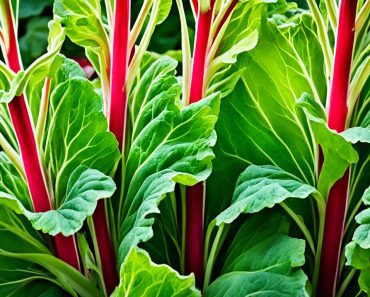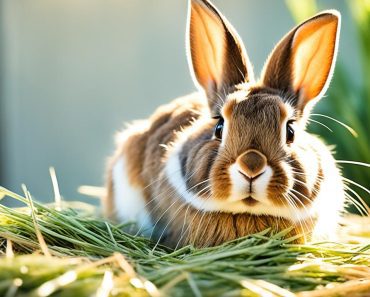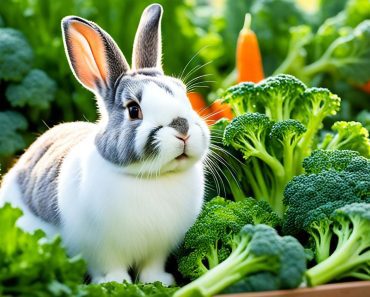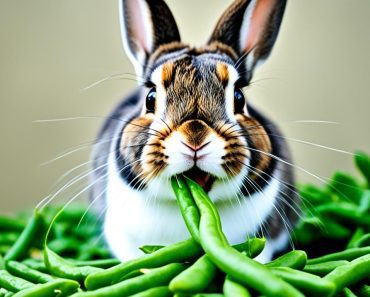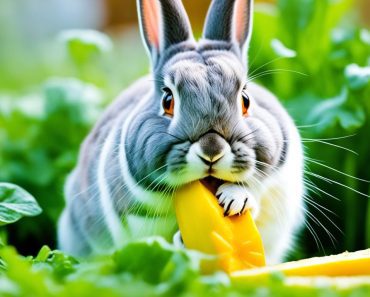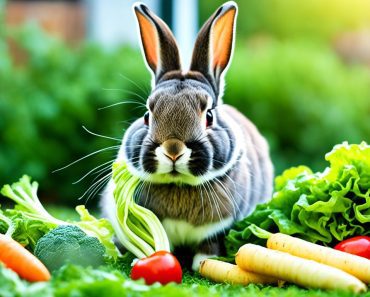As a rabbit owner, I always want to make sure I’m providing my furry friend with a balanced and nutritious diet. While hay and fresh vegetables are the staples of a rabbit’s diet, I’ve often wondered: can rabbits eat apples? After doing some research, I’m happy to share what I’ve learned about rabbits and apples.
Firstly, the good news is that rabbits can indeed eat apples! However, there are a few important guidelines to keep in mind. The seeds of an apple can be toxic to rabbits, so it’s crucial to remove them before offering this fruit to your furry companion. Additionally, apples should be given in moderation due to their high sugar content. Too many apples can cause digestive issues for rabbits, so it’s best to limit their intake.
Now, you might be wondering why rabbits would enjoy apples as a treat. Well, rabbits have a sweet tooth just like us! While their main diet should consist of hay and fresh vegetables, a small amount of fruit can add variety and excitement to their diet. It’s important to remember that treats should only make up about 1-2 tablespoons of a rabbit’s daily food intake.
Can Rabbits Eat Apples? Yes, they can, with proper caution.
- Rabbits can eat apples, but the seeds should be removed.
- Apples should only be given in moderation due to their high sugar content.
- A rabbit’s diet should primarily consist of hay and fresh vegetables.
- Consult with a veterinarian to determine the appropriate amount of treats for your specific rabbit.
- Introduce new foods slowly and in small amounts to avoid digestive issues.
The Right Amount of Treats for Rabbits
When it comes to giving your rabbit treats, it’s important to find the right balance. As a responsible rabbit owner, you want to ensure that your furry friend stays happy and healthy. Treats, including fruits like apples, can be a delicious addition to your rabbit’s diet, but they should be given in moderation.
It’s recommended to offer rabbits approximately 1-2 tablespoons of treats per day. However, this amount may vary depending on factors such as your rabbit’s weight, size, and overall health. Smaller rabbits will naturally require fewer treats than larger ones.
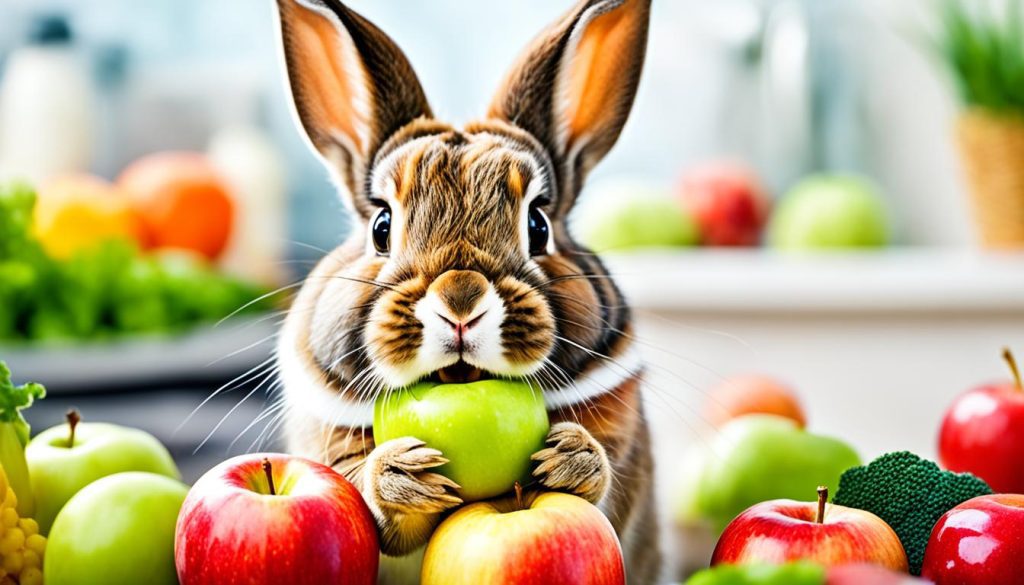
When it comes to feeding apples to your rabbit, it’s vital to remember that apples should be given in moderation. While rabbits can enjoy the taste of apples, their high sugar content means they should not make up a significant portion of their diet. Excessive consumption of sweet treats can lead to digestive issues and weight problems in rabbits.
If you’re uncertain about how many treats to give your rabbit, it’s always best to consult with a veterinarian. They can provide guidance based on your rabbit’s specific needs and help you strike a balance between indulgence and a healthy diet.
By understanding the appropriate amount of treats for your rabbit and the importance of moderation, you can ensure that your beloved pet stays happy and healthy.
Safe Fruits and Vegetables for Rabbits
While apples can be a treat for rabbits, there are also other fruits and vegetables that are safe for them to consume. It is important to provide a diverse diet for your furry friend to ensure they receive a variety of nutrients. Incorporating a range of fruits and vegetables can not only add flavor to their meals but also provide additional vitamins and minerals.
Safe Fruits for Rabbits
When it comes to choosing fruits for your rabbits, it is crucial to select options that are safe and beneficial for their health. Some safe fruits that you can offer as occasional treats include:
- Bananas
- Strawberries
- Raspberries
These fruits provide natural sweetness and are packed with essential nutrients that can contribute to your rabbit’s overall well-being. It is important to remember that fruits should be given in moderation, as the high sugar content can cause digestive issues.
Safe Vegetables for Rabbits
Adding vegetables to your rabbit’s diet can help provide them with essential vitamins, minerals, and fiber. Some safe vegetables that you can incorporate into their meals include:
- Carrots
- Lettuce
- Kale
These vegetables offer a range of flavors and textures that can keep your rabbit’s meals interesting. However, it is important to introduce new foods slowly and in small amounts to avoid any digestive upsets.
Remember to consult with your veterinarian before introducing any new fruits or vegetables to your rabbit’s diet to ensure they are suitable for your specific pet.
Incorporating safe fruits and vegetables into your rabbit’s diet can provide them with added nutrients and flavor. However, it is crucial to offer these treats in moderation and maintain a balanced diet primarily consisting of hay and fresh vegetables. By providing a diverse and well-rounded diet, you can ensure your rabbit’s overall health and happiness.
Healthy Leafy Greens as Treats
Instead of giving rabbits sugary fruits and vegetables as treats, a healthier option is to offer them leafy greens. Leafy greens not only provide a variety of tastes and textures for rabbits but also contribute to their overall health. Rabbits should be given 1-2 cups of fresh leafy greens per day, depending on their size.
The Benefits of Leafy Greens for Rabbits
Leafy greens are an essential part of a rabbit’s diet because they are low in calories and high in fiber, which promotes good digestion. They also contain vital nutrients such as vitamins A, C, and K, as well as minerals like calcium and potassium.
By incorporating leafy greens into your rabbit’s diet, you can help support their immune system, improve their overall health, and prevent common health issues such as obesity and dental problems. Additionally, the act of chewing leafy greens helps to wear down their constantly growing teeth.
Choosing the Best Leafy Greens for your Rabbit
When selecting leafy greens for your rabbit, it’s important to choose varieties that are safe and beneficial for their health. Some examples of healthy leafy greens for rabbits include:
- Kale
- Lettuce
- Cilantro
- Parsley
- Spinach
These greens can be offered to your rabbit in rotation to provide a range of nutrients and flavors. Remember to wash the greens thoroughly and remove any wilted or spoiled leaves before serving them to your furry friend.
Using Leafy Greens as a Reward
In addition to being a nutritious part of a rabbit’s diet, leafy greens can also be used as a reward for good behavior or as a training incentive. By associating leafy greens with positive reinforcement, you can encourage your rabbit to learn new tricks and behaviors.
Rather than relying solely on sugary treats, incorporating leafy greens into your rabbit’s training routine helps to keep their diet balanced and promotes their overall well-being.
Remember to introduce new foods slowly to rabbits and monitor their response. Every rabbit is unique and may have individual preferences or sensitivities. If you have concerns about your rabbit’s diet or health, it is always best to consult with a veterinarian for personalized advice.
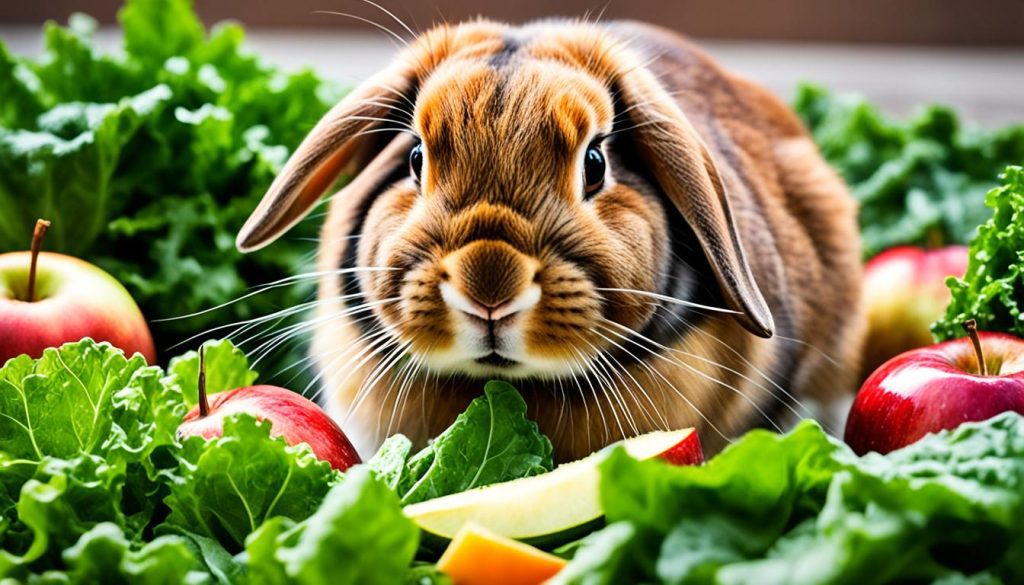
Conclusion
When it comes to feeding treats to rabbits, moderation is key. While apples can be a tasty and nutritious treat for rabbits, it’s important to give them in small amounts to avoid potential digestive issues. Rabbits’ diets should primarily consist of hay and fresh vegetables to ensure the right balance of nutrients.
Providing a variety of safe treats, such as fruits, vegetables, and leafy greens, can help ensure that your rabbit is enjoying a well-rounded and healthy diet. While apples are safe for rabbits, it’s essential to remember that they should be given in moderation due to their high sugar content. By offering a mix of treats, you can provide your rabbit with a diverse range of vitamins and minerals.
However, it’s always important to consult with a veterinarian for personalized advice on your rabbit’s diet. They can provide you with specific guidance based on your rabbit’s individual needs, size, and health. Veterinarians are experienced in providing expert dietary recommendations for rabbits and can help you create a balanced and nutritious diet plan for your furry friend.

